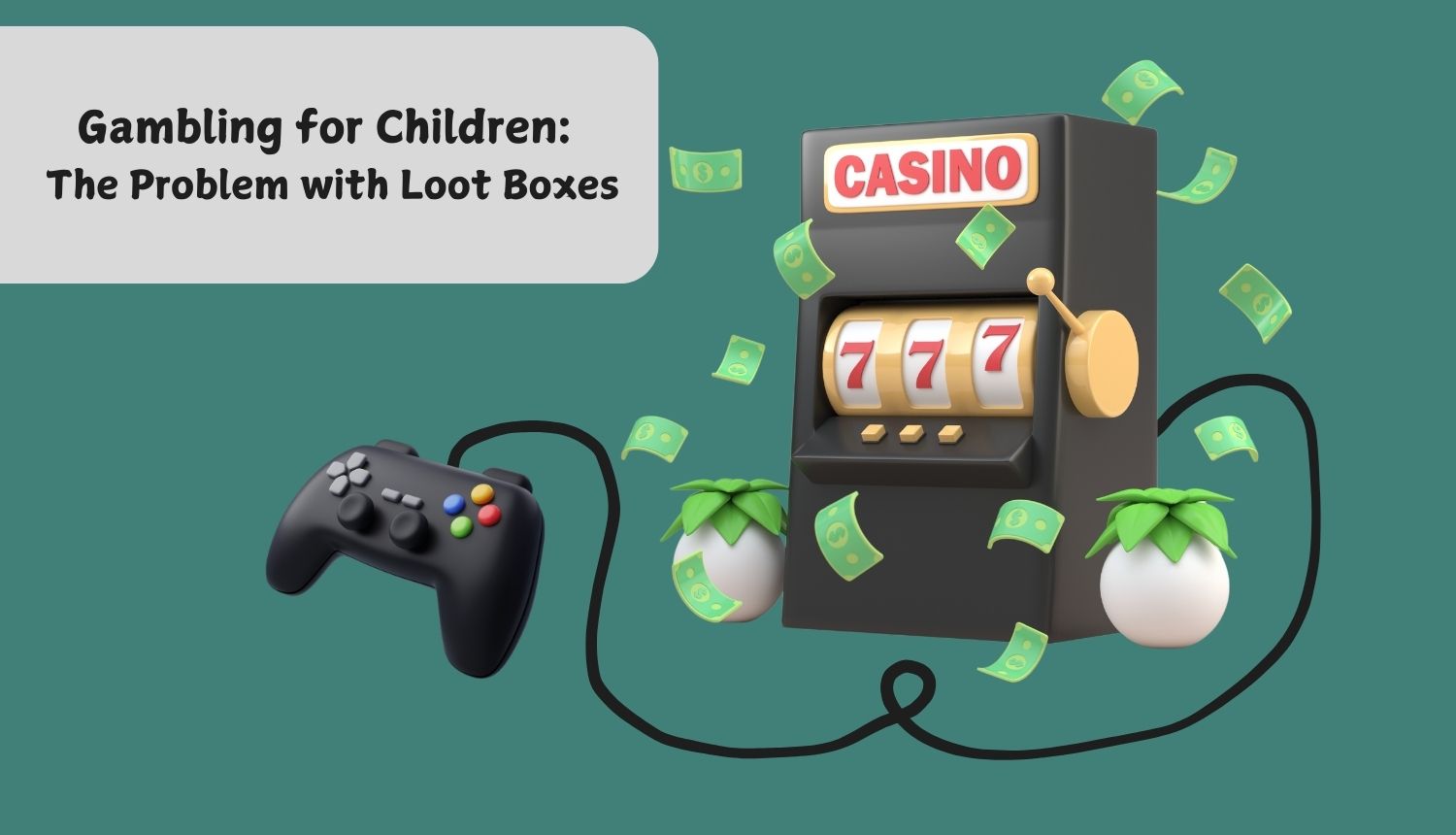Gambling for Children: The Problem with Loot Boxes

Try to throw some money down in a Las Vegas casino if you’re under 21 years old, and you’ll be quickly escorted out the door. Try to buy a lottery ticket at a gas station before at least 18, and you’ll face the same treatment.
But gamble some cash in an online game for a chance at obtaining that “Legendary” character skin you’ve been wanting? Why, don’t let us stop you.
For just a small amount of money, you can “spin the wheel” to try getting your favorite weapon or character skins, emotes or other customizations. Depending on the game, you might even unlock a weapon or item far better than any normal player can access, giving you a tactical advantage.
Of course, none of it is guaranteed. But hey, the more money you pay, the more chances you’ll get to try obtaining what you want!
Can anyone spare a dollar or twenty?
What Are Loot Boxes?
For those unaware, loot boxes in video games function similar to lottery scratch tickets. With a scratchcard, you pay a dollar or two in the hopes that when you scratch off the ink, it’ll reveal that you’ve won money or a prize. With a loot box, you pay a dollar or two in the hopes that when you click it open, it’ll reveal that you’ve won a valuable virtual item.
Loot boxes appear in many popular video games (and most notably free-to-play games). Overwatch, Team Fortress 2, Star Wars Battlefront 2, Counter-Strike: Global Offensive, Rocket League and Apex Legends are but a handful of examples.
But like a scratch ticket, there’s no telling what you’ll get. You’re guaranteed, at minimum, a “common” item. But more than likely, a “common” item isn’t what you have your eye on.
For some games, certain loot box items give players a blatant power advantage over others, incentivizing weaker players to either fork over money in the hopes they’ll get the same loot box advantage or else play at a permanent disadvantage. However, for others, running that gambit is the only way to progress. These games, predominantly available in the East, are defined as gacha games. They rely on similar random number generator mechanics, many of whichrequireitems only obtainable from paid-for loot boxes in order to play the game or progress the story.
Of course, most of these games wouldn’t dare to admit that they’re exploiting players. After all, you can, theoretically, obtain the very same items without paying a dollar. Some games will give you one free spin every day you log in. But others will take you logging thousands of hours of gameplay. But both cases recognize that most people won’t spend the time to grind or wait for the item when you could just spend $20 to get it instantly.
That temptation is magnified when the reward means other players will see that you’ve gotten a special character skin, weapon or ability. Furthermore, many people are willing to pay real money for purely aesthetic skins. Some will even shell out hundreds, if not thousands of dollars to obtain them. You might feel just one loot box away from getting one of those valuable skins and becoming rich off selling it.
But even if your kid doesn’t hope to get an epic skin and strike it rich, research shows that younger kids have a harder time understanding the relation between virtual and real-life currencies. That means, so long as your credit card is tied to the account, they’ll be more likely to just keep spending money to purchase and open more and more loot boxes.
Do Loot Boxes Affect Kids?
Gamers have never been particularly fond of the loot box, describing games that contain them as “pay-to-win” or “pay-to-progress.” The wallets of parents whose children have spent thousands of dollars on the mechanic likewise cry out for mercy. Even some of you, our readers, have recently commented on the loot box craze, comparing it, like me, to unregulated gambling. (So props to you, Boris, for leaving such a timely comment that it forced me to update this blog before we published it).
And that observation is exactly right. It’s the reason why the Australian government recently set new rules for the video game industry, stating all video games that contain loot boxes will have to be rated at least ‘M’ (Mature). The rating means that no child under the age of 15 will be able to purchase the game (at least without the help of a parent).
The measure officially went into effect in late September 2024. The reason? Because loot boxes are a form of “gambling-like content.” In other words, the measure “brings the gaming industry in line with real-world, age-based restrictions in Australia.”
The United States is likewise looking into the effect loot boxes have on children. In 2019, the Federal Trade Commission hosted a workshop to gather insight on the claim that loot boxes encourage addictive gambling behavior in children. In their report of the event, they detailed one researcher’s findings who demonstrated that “individuals who purchase a large amount of loot boxes score higher on an index of problem gambling.” Despite being unable to prove whether one necessarily causes the other, the researcher found the correlation to be “concerning.” In fact, the issue is so concerning that it’s caused at least one state to provide resources to help combat and prevent youth gambling.
And if emerging studies are finding positive links between loot boxes and gambling, it’s very bad news for children.
While describing why Nevada casinos prohibit people under 21 from gambling, ex-casino executive and spokesperson Alan Feldman explained the added risk children specifically face from engaging in gambling.
“Problem gambling affects youth disproportionately,” Feldman said. “We see more people under 21 in the higher incidence of harm from gambling than those above 21 […] There’s also a direct connection between research done on people who are in treatment for gambling disorders with their having started at a young age. To be clear, that doesn’t mean that everyone who gambles at a young age will be affected by a gambling disorder. However, the majority of those who are affected by it started at a young age.”
How Should Parents Respond?
Fortunately, there’s some good news for parents: Loot boxes aren’t nearly as common as they once were—at least, not in Western games. Some, such as Fortnite, have done away with random-item loot boxes. Countries like Austria and Germany have imposed restrictions on them, and Belgium has outright banned them. And if the aforementioned FTC study is anything to go on, the United States may not be too far behind in its own regulations, too.
But “loot box” mechanics aren’t just limited to video games—they’re just more problematic. Technically, every time you go to the store and purchase a sleeve of Pokémon or Yu-Gi-Oh cards, you’re engaging in the same mechanical idea. However, whereas mom and dad can limit a child’s card sleeve purchase to just one or two per visit, online loot boxes are harder for families to regulate.
So don’t wait for the government to get involved.
Sit down with your child and explain to them how loot boxes can be appealing. There’s a dopamine rush every time you click that button and see that you’ve gotten a pretty special item. But that rush can become addictive and seeking it out can encourage unhealthy behaviors and unwise decisions.
And as a more practical tip for you, the parent, never save your credit or debit card to a device your child has unmonitored access to. You just might save yourself from a large bill courtesy of a virtual Las Vegas.
Related
Lincoln casino delivers big for Nebraska, contributing nearly $12M in…
LINCOLN, Neb. (KOLN) - A new report highlights the latest gambling tax revenue figures, with Lincoln benefiting from a late-year boost fueled by sports betting.
Why you might be seeing sports betting ads in Missouri,…
JEFFERSON CITY, Mo. (KY3) - Some social media and television gambling advertisements are raising eyebrows in Missouri.A DraftKings campaign is advertising a dea
Gambling.com Group Enters into Definitive Agreement to Acquire Odds Holdings,…
Transaction Expands Gambling.com Group’s Addressable Market with Recurring Revenue From Consumer Subscription Products and Enterprise ClientsCHARLOTTE, N.C.,












